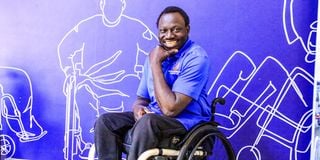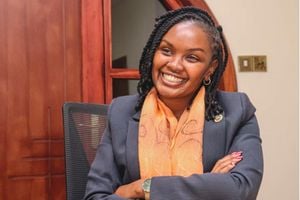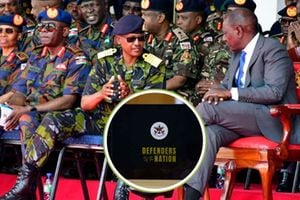
Chief Executive Officer of Hope Mobility Kenya, Michael Panther, on September 16, 2024, at the facility in Nairobi.
It is often said that the true measure of resilience is not found in how hard you fall, but in how gracefully and powerfully you manage to rise again, even after facing life's most difficult challenges.
For Michael Panther, life dealt one of its most devastating blows when he lost his ability to walk as a child. Yet, rather than succumbing to despair or letting his circumstances define him, Michael chose to rise above his hardships. Michael’s story traces back to his humble beginnings as a young boy, born into the harsh realities of a war-torn South Sudan, where survival was an everyday struggle.
“I am from South Sudan, born right in the middle of a civil war. Life was never easy; we were always on the move, running for our lives. In the midst of that chaos, I fell ill, which made our already difficult existence even harder,” Michael says.
During those turbulent times, access to medical care was nearly nonexistent. Michael’s illness went undiagnosed for a long time. “I was just a normal boy, running around, full of energy, doing everything on my own, very healthy. Then suddenly, I got sick, and no one knew what was wrong. We simply didn’t have access to proper healthcare.” His condition gradually worsened, leading to progressive weakness in his legs and, ultimately, leaving him unable to walk.
Michael’s parents, like many other families in South Sudan, were forced to make an impossible decision. His mother had to stay behind with his younger siblings while his father embarked on a perilous journey to Kenya, carrying his son along, hoping to find better medical care.
“I was about 10 years old, and I could barely walk without any support. We started this long, exhausting journey from South Sudan to Kenya, with my father carrying me most of the way,” he says, the memory tinged with both pain and gratitude. The journey spanned several grueling months, filled with uncertainty, hardship, and a flicker of hope that kept them moving forward. Yet, even after reaching Kenya, their struggles were far from over.
“When we arrived at the refugee camp, they didn’t have the right medication for my condition. All I was given were painkillers to manage the pain, but there was nothing that could halt the progression of the disease,” he says. A glimmer of hope emerged when doctors from Cure Hospital in Kijabe visited the camp. They were on searching for children with treatable disabilities. “By that time, I had almost lost all hope. We had been living at the camp for six months, desperately looking for help,” Michael says.

The doctors diagnosed him with tuberculosis of the spine, a condition that could have been treated had proper medical care been available earlier. Unfortunately, by the time they discovered it, the damage was irreversible. “I was put on a waiting list for surgery, which took another six months. In total, it took me almost two years from the time I left South Sudan to finally receive the treatment I needed," he says.
Michael underwent a complex surgery and spent an arduous period in the ICU. “The doctors did not think I would survive, but sometimes, life surprises you with miracles. God saved my life,” he says.
New life in a wheelchair
When Michael left the ICU, he was informed that he would spend the rest of his life in a wheelchair. This was a reality that could have easily broken many, but for Michael, it marked the beginning of a new chapter, a second chance at life.
During his recovery, he encountered a missionary couple who, “changed his life forever.” “They told me they were going to take care of me, including enrolling me in school. To this day, I still wonder why they chose me out of all the children they could have helped,” he says.
This marked the beginning of a transformative journey. Michael was enrolled in a school for children with disabilities in Machakos. Despite having no formal education prior to this, he was determined to succeed.
“I started in class seven, and I remember telling the teachers, 'If I fail, I will repeat the class until I get it right.' Fortunately, I passed," he says.
He would later earn a scholarship to study economics at Louisiana State University in the US, a journey that would eventually shape his vision of hope for others.

Chief Executive Officer of Hope Mobility Kenya, Michael Panther, on September 16, 2024, at the facility in Nairobi.
A Vision of Hope
While studying in the US, Michael witnessed a stark contrast in how people with disabilities were treated. “In the US, people with disabilities are embraced, loved, and included. They do not pity you; instead, they accept you for who you are and celebrate your uniqueness,” he says. This newfound perspective sparked a desire in him to bring about change for people with disabilities in Kenya.
"I joined an organisation in the US that provided wheelchairs to people around the world. Seeing the difference a simple wheelchair could make in someone's life, I knew I had to bring that to Kenya," he says.
In 2018, along with a group of friends, they raised funds to transport their first container of wheelchairs to Kenya, choosing Kijabe. “Almost 1,000 people showed up, but we only had 200 wheelchairs. It was heartbreaking to see the overwhelming need," he recalls.
This experience led to the birth of Hope Mobility International, an organisation that provides custom-fitted wheelchairs to those with disabilities in Kenya. "I resigned to focus on this full-time, I see it as God's purpose for my life," says Michael.
Why Kenya?
Despite being born in South Sudan, Michael feels a deep connection to Kenya, a bond that goes beyond borders. "Kenya is where God gave me a second chance at life. It is the place that embraced me, treated me, and gave me an education. I owe so much to this country," Michael says.
Hope Mobility’s mission goes beyond merely providing physical mobility. They seek to promote inclusivity, counselling being a big part of their work. The organisation is now producing wheelchairs locally through a partnership with a US group called Hope Haven. It’s a step towards creating jobs for local communities, including parents of children with disabilities.
"I would love to see more integration of children with disabilities in schools. They should not be isolated,” Michael concludes.




